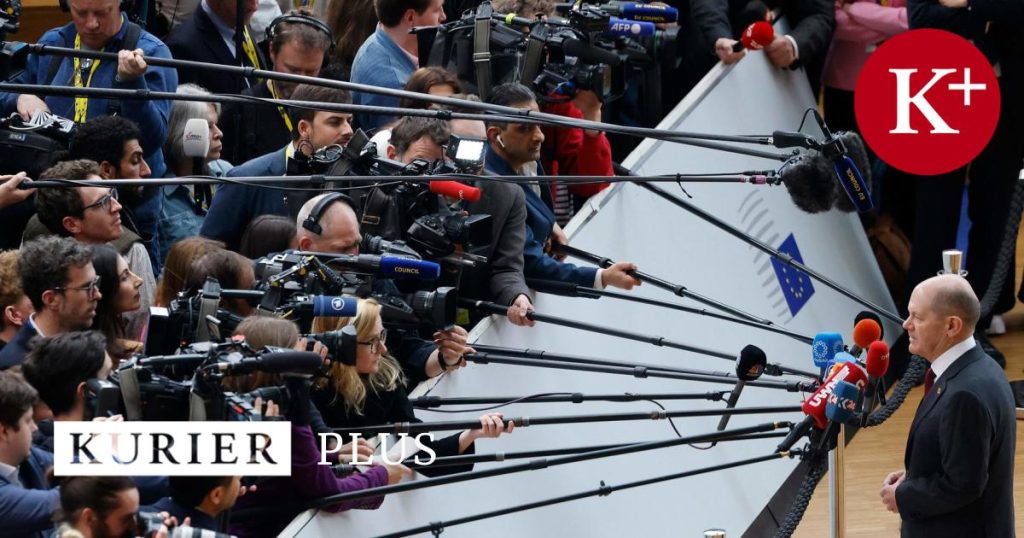
Ukraine, war, China – all crises faded into the background at the summit. Instead, the heads of state and government were looking for a way out of the wrangling over the combustion engine end. Without success
It is, so to speak, the catwalk for Europe’s political leaders: the red carpet in Brussels’ Council building, on which the heads of government approach the densely packed and impatiently waiting crowd of journalists. There, in front of the forest of cameras, it is important to place the political message of the EU summit day. “A solution to the dispute over combustion cars is well on the way,” promised German Chancellor Olaf Scholz, as usual, calmly.APA/BKA/CHRISTOPHER DUNKERChancellor Karl Nehammer in Brussels at the EU summit
And Chancellor Karl Nehammer soon followed suit: He was committed to “green combustion engines with e-fuels”.
Luxembourg’s Prime Minister Xavier Bettel, on the other hand, moaned into the microphone rather annoyed: The topic of phasing out combustion engines or e-fuels is not on the agenda of the EU summit. “It’s not a request concert when we come to Brussels.”
Everything is actually always strictly regulated at the two-day EU summit in Brussels: Which topic is discussed when. Or as the final declarations, which were precisely negotiated to the point and comma, read. And then everything always turns out differently.
Crises, wars and tensions often throw the summit choreography upside down. This time it was the argument about the combustion engine. The question of whether new petrol and diesel engines in the EU will be turned off after 2035 should have been clarified by early March. But then Germany’s Transport Minister Wissing (FDP) blew up the blockade – and the search for a future solution has since come to a standstill.
And no solution was expected at the EU summit yesterday either. When the 27 EU heads of state and government sit down at their round table, they can talk, remain silent or argue – they have no legislative power. They only set the political direction.
Who says what – not a word of it gets out. Not even his closest advisors sit next to Chancellor Karl Nehammer.
What is discussed in the Holy Grail of the EU can only be written down by one diplomat per country. Every 20 minutes he rushes outside to quickly brief the Chancellor’s delegation.
A million grenades
And yesterday it was about Ukraine. The EU wants to deliver a million grenades to Ukraine by the end of the year. The nod was approved quickly and without any problems – very different from the question of whether fertilizer exports from Belarus should be exempted from EU sanctions. “Absolutely not,” Poland and the Baltic States objected to this demand.
While the discussions in the uppermost area of the egg-shaped council building drag on in hermetic seclusion, a few floors below the thousands of journalists react with increasing panic. who heard what which rumor? If a diplomat drops by from above for a quick chat, a bunch of journalists rush out: Is there any news?
Europe’s heads of state and government have now had lunch with UN chief Antonio Guterres, a video call with Ukrainian President Zelenskiy and the quickly unsolvable question of how Europe’s economy can free itself from its over-dependence on China.
Macron’s favorite subject

Then Emmanuel Macron enters. The French President argues with verve for his favorite topic, “strategic European autonomy”. From the Paris point of view, this means nothing other than: nuclear power is needed for energy autonomy – and it is virtually as greenhouse gas-free as renewable energy sources. Which means: Nuclear power must also be funded with billions of euros. This in turn calls Austria onto the scene. Even before the summit, the government in Vienna had prevented the words “nuclear power” and “renewable energies” from appearing together in the summit declaration.
The evening is getting later and later, but the most important topic from Nehammer’s point of view only comes up at the end: migration. It is the Austrian Chancellor and Italy’s Prime Minister Meloni who are pushing. “Migration is a European challenge that requires a European response,” read the final declarations at her request.
And the combustion engine? It wasn’t discussed yesterday at the big, joint summit table. It was probably inevitable that German Chancellor Scholz nevertheless had to listen to some criticism in one-to-one talks with other government colleagues. But, as a head of government recently confirmed to the KURIER: “We don’t have any shouting. Discussions always go smoothly, even if you have a different opinion.”
